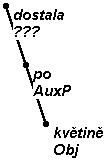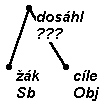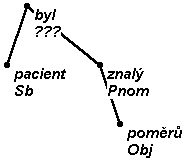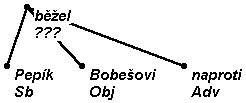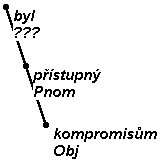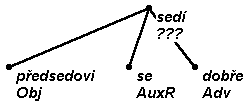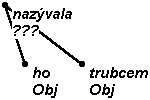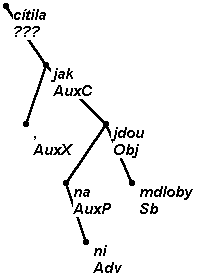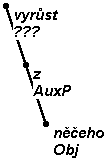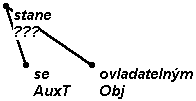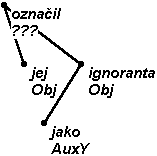In the part Definition of Obj below, we define the object to which this section is devoted. We find that our conception as compared with Šmilauer's approach is somewhat broader.
Moreover, in the part Combined functions we will be concerned with the so-called combined functions AtrObj and ObjAtr.
Then we shall deal with possibilities to express classical object, which can be found in the part Expressing Obj. An object can be expressed by a noun in accusative (Expression of object by a noun in accusative), genitive (Expression of object by a noun in genitive), dative (Expression of object by a noun in dative), instrumental (Expression of object by a noun in instrumental), further by a prepositional case (Expression of object by a noun in prepositional case), infinitive (Expression of object by an infinitive), and by a subordinate clause (Expression of object by a subordinate clause). Also a reflexive pronoun (se/si) can occur in the function Obj (Reflexive pronoun se (...self)).
Lastly, we shall come back to the types of object which Šmilauer defines in another way and which can be expressed in some other form than it has been described above. This concerns such types as origin and result in the part Object of the type Origin and Result and object after copula and semi-copulative verbs in the part Object after copulas and semi-copulas.
Object is a modifying sentence member. As a rule, it is governed by a verb (i.e. the verb determines the case form of the its Obj), or by an adjective. As Obj all kinds of objects (direct, indirect as well as effect or second object) are denoted. An object represents either what is the result of an action (napsat dopis-Acc - to write a letter), or what has been directly affected by the action (dotknout se stolu-Genitive - to touch a table), or what the action is directly aiming at (radit chlapci-Dative - to advise a boy).
Being governed by its head, the object differs from Adv, the form of which is not determined by its head (see Adverbials (and borderline cases)). The problems of verbal and adjectival government ('rection') are complicated to such an extent that even the information on these constructions in their individual entries contained in the Dictionary of Standard Czech (Slovník spisovné češtiny) often do not satisfy our needs.
We understand as Obj also the dependents mentioned by Šmilauer as special types of adverbials called "origin" and "effect" and as "constructional complement". These two instances are dealt with in the parts Object of the type Origin and Result and Object after copulas and semi-copulas.
As noted in the part Expression of object by an infinitive, owing to our conception of predicate we also define as Obj the infinitive with modal or phasal verbs. (See the part Compound verbal predicate.)
The combined functions are dealt with in detail in the part Combined functions, where all of them are described. Two of them concern the problem of object - AtrObj and ObjAtr - to be only briefly mentioned here. The combined functions are used where the analysed member (node) can figure in more functions within the given sentence, without the meaning being substantially changed by this fact (the sentence is not strictly homonymous in what concerns the function of the member analysed).
Therefore, the mentioned two functions we use in case a member can figure as object (Obj) of its predicate and, at the same time, an attribute (Atr) of some node situated lower in the tree. If the annotator feels that the given member is rather an attribute, he will use the function AtrObj. Otherwise ObjAtr will be assigned.
No matter which of the two functions may be used, the given node will always take the same place in the tree, namely, that where it would be placed if it were an attribute (Atr). Therefore, it will never depend directly on the predicate.
The object is expressed by a syntactic noun in accusative, genitive, dative, instrumental, prepositional case or by infinitive or a subordinate clause.
In some cases the function Obj is assigned to a reflexive pronoun se - see Reflexive se, si.
Accusative is the basic object case.
In some circumstances locative with the preposition po can be used instead of accusative. Partitiveness (sharing) can be expressed in this way. The construction dostala po květině (she obtained a flower (apiece, one by each admirer, friend, etc.)), corresponds to the construction of she obtained a flower.
Partitive genitive and genitive of negation belong to this type, too, although they are not 'governed' in the strict sense. The verbs on which they depend prototypically govern accusative constructions. The genitive object just competes with the accusative pattern and its use is motivated semantically.
The partitive genitive can play the role of an Obj, but if a quantitative modification governs the genitive, this modification figures as Obj and the noun in genitive becomes its Atr. This problem is dealt with in more detail in the part Genitive in the function of Sb, Obj and in the function of their Atr.
Apart from the accusative, dative represents the basic object case. It is either the only (direct) object (ex. (1)), or it stands along with the accusative object, being then referred to as indirect object (ex. (2)). This type of expression comes close to the adverbial ethical dative. Distinguishing them and other problems are described in The boundary line between free and 'bound' dative.
For the most part, adjectives with dative are adjectives of action.
As Obj also the so-called subject dative is regarded, which is illustrated by the following three examples. It is also mentioned in The boundary line between free and 'bound' dative.
Instrumental represents predominantly an adverbial case. Only rarely it happens to be a case governed by its head, preserving at the same time apparent traces of adverbial meaning, especially that of instrument. As an object it usually figures after verbs having the meaning of moving something (ex. (1)), deal with st., engage in st. (ex. (2)), handle, save up, waste (ex. (3)) and call, address s.o. as (ex. (4)).
On the borderline between adverbial and object, nouns in instrumental modify verbs of sensual perception (tábor zněl zpěvem - the camp resounded with singing) and also verbs with meaning 'provide with' (pokrýt střechu slámou - to cover the roof with straw). These cases are characterized here as Adv (see Adverbials (and borderline cases)).
The actor in passive constructions is always regarded as Obj here.
Governed nouns are only accompanied by basic (simple) prepositions, which lose their meaning nuances in them, getting grammaticalized strongly. E.g., in the phrase myslet na někoho - to think of s.o., the preposition na does not display its meaning of being placed on a surface. (The original meaning remains in adverbial cases not governed by their heads - e.g. sedl si na stůl - he sat down on a table.) The transition between Obj and Adv is smooth here, which means that finding an exact boundary is impossible.
Also the locative case with the preposition po can have the function of Obj. As we have mentioned, it is used in place of plain accusative (Expression of object by a noun in accusative). In this way partitiveness is expressed where the construction dostala po květině (she obtained a flower (by each ...)) corresponds to dostala květinu - she obtained a flower.
If case government is signalled by means of a (pronominal) reference expression, the infinitive is regarded here as an attribute of the reference word, which obtains the function Obj. (See Referring pronoun to (that)).
Note
In our view the function Obj is also assigned to infinitives connected with modal or phasal verbs (i.e. they are parts of compound predicates) although they cannot be replaced by nouns or subordinate object clauses, as is possible in other infinitival constructions (see the part Compound verbal predicate.)
For the reflexive pronoun se, si in the function Obj see Reflexive se, si.
Šmilauer regards Origin and Result as special types of adverbials. We, however, assign the function Obj to them.
When the above expression of objects is introduced by jako (as), the latter word is assigned afun AuxY and gets suspended under the node Obj (see also the part The conjunction jako introducing complement or object).

